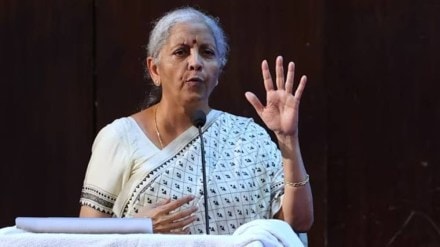Finance minister Nirmala Sitharaman on Thursday hinted at another round of consolidation of public sector banks, and possible privatisation of some of them, as part of the government’s efforts to create more “big banks”.
Addressing the 12th SBI Banking & Economics Conclave in Mumbai, she reiterated that India, as a fast-growing economy with diversified banking needs for its large population and thriving businesses, “needed a lot of big, world class banks.” She said the government would confabulate with the Reserve Bank of India and the banks, “to see how they want to take (the plan) forward.”
“You need an ecosystem in which more banks can operate to grow, and that environment is well- established, but I need it to be a bit more dynamic,” she said, adding that “some work is happening on it.”
Earlier this week, speaking at the Delhi School of Economics, Sitharaman said that privatisation of banks won’t hurt financial inclusion.
Sitharaman dispelled the fears that a full-scale regulatory clamp-down may be in the offing on futures and options (F&O) trading, by saying that, rather, “the government is here to remove the roadblocks and work on them.” She emphasised that it is for the investors to show responsibility and understand the risks associated with derivatives trading. The government is “not here to shut the door on F&O trading,” she clarified.
The minister’ remarks bear out a recent statement by the Securities and Exchange Board of India (SEBI) chairman Tuhin Kanta Pandey that weekly F&O expiries, which are used by savvy market participants, can’t be dispensed with. The regulator has over the past year taken a host of steps to curb speculative F&O activities and safeguard retail investors from making huge losses in this market. This has resulted in a decline in the growth of small-ticket trading, and weekly options volumes. Analysts have been calling for a fine balance between promoting innovative market instruments and investor protection. Pandey, however, stressed that irrational exuberance by small market participants would need to be controlled.
Sitharaman noted that the “world is facing slower globalisation, fragile supply chains, and rising climate transition costs.” “Global headwinds (are) becoming prominent and global institutions are fading,” she said, but added that “these external shocks are not only testing the resilience of India’s economy but also underlining the need for stronger domestic capabilities and diversified trade partnerships.”
“…capital movements are becoming speculative, and volatility and uncertainty are becoming everyday language. There are the different kind of headwinds that we are facing whether it is in terms of currency exchange rate or globally-driven inflation,” the minister said.
She emphasised that to sustain high growth, India must invest in people. “Our workforce needs continuous upskilling and reskilling to meet the demands of emerging technologies and global competitiveness, ensuring higher labour productivity and better-quality jobs,” she said.
According to her, the path to economic self-reliance must be shaped by our own realities, needs, and aspirations. “A one-size-fits-all approach, suitable for smaller or more homogenous economies, cannot work for a country of India’s scale and complexity. We must aim for broad-based progress which is to achieve wins across sectors and communities. That is why our focus spans from farmers, MSMEs, leather, textiles, and tourism to emerging areas like technology and advanced manufacturing,” she said.
PSB consolidation process has taken a backseat, after a flurry of activity seen in 2020, when 27 of them were merged into 12.
In her speech at DSE, she said even 50 years after bank nationalisation, financial inclusion fell short of the desired level. In the name of financial inclusion, keeping banks under government control, and not allowing them to professionalise themselves, meant that the government had to infuse capital every now and then,” Sitharaman said.
